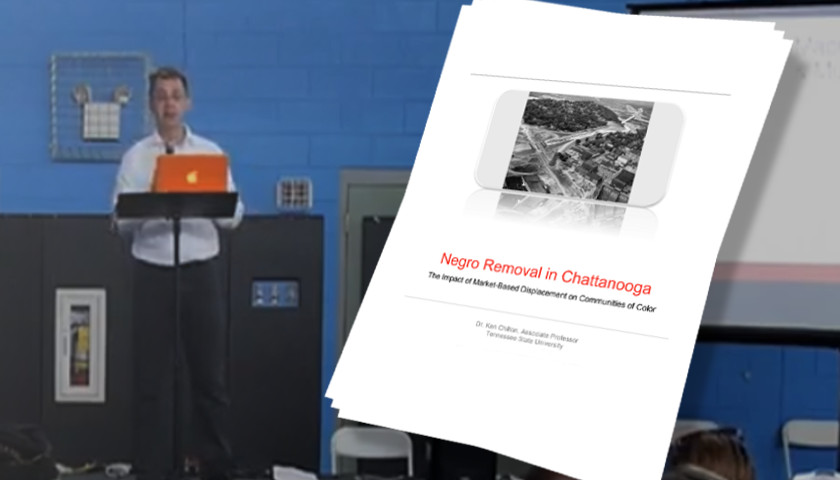The National Telecommunications and Information Administration (NTIA) this week announced that former Chattanooga Mayor Andy Berke will serve that agency in a senior leadership position and will have direct influence over President Joe Biden. Berke is joining NTIA as a special representative for broadband.
Read the full storyTag: Andy Berke
Chattanooga Police Could Fine People $50 for Going Against Mayor Andy Berke’s COVID-19 Orders
Anyone in Chattanooga caught violating Mayor Andy Berke’s executive orders during a civil emergency would have to pay up to a $50 fine, plus court costs, according to a proposed city ordinance.
Read the full storyChattanooga Officials Are on the Prowl for Anyone who Commits Hate Speech
Chattanooga officials are clamping down on hate speech through a program called Hatebase, but they will not specify what is and is not hate speech.
Read the full storyChattanooga to Spend More Money on Homeless, Despite Past Results
Chattanooga Democratic Mayor Andy Berke reportedly wants to spend more taxpayer money on the homeless, even though past initiatives haven’t accomplished much in terms of results.
Read the full storyWife of Hamilton County Superintendent Takes $90,000 a Year Job Working for Chattanooga Mayor Andy Berke
The wife of Hamilton County Superintendent Bryan Johnson has taken a $90,000 a year position as a senior advisor to Democratic Chattanooga Mayor Andy Berke. This, according to Berke’s spokeswoman Richel Albright, who said Candy Johnson joined Berke’s administration as one of his senior advisors. Johnson took the job last week, Albright told The Tennessee Star. Chattanooga City Council member Chip Henderson said Thursday that no one from Berke’s administration had formally introduced Johnson to the council, as is customary. “I will tell you we have not been briefed on the hire,” Henderson said. This, despite The Chattanoogan reporting Council member Demetrus Coonrod welcomed Johnson at Tuesday’s City Council Agenda Session. “Stacy Richardson, the mayor’s chief of staff, said she would discuss with council members ‘offline’ the role of Ms. Johnson at the mayor’s office,” The Chattanoogan reported. Albright said several people have advised Berke since 2013, most recently Hames McKissic, who left in 2018. “Mayor Berke is the final decision maker on positions in his office,” Albright said in an emailed statement to The Star. On her LinkedIn page, Johnson describes herself as an independent consultant. She also was the lead education policy contact for the Nashville Area…
Read the full storyChattanooga May Give Taxpayer Money to Small Businesses
Something known as the Neighborhood Reinvestment Fund in Chattanooga might use $500,000 in taxpayer money on the city’s small businesses, according to The Chattanooga Times Free Press. Specifically, this money will help small businesses with facility renovations, equipment and inventory acquisition, and website development and marketing. According to the paper, this is Mayor Andy Berke’s initiative to bolster existing small businesses and neighborhoods. “In the first year, Berke said he expects more than 10 companies to take advantage of the effort that could provide individual businesses with loans of up to $25,000,” The Chattanooga Times Free Press reported. Businesses would have to match a percent of the loan amount, depending on how much is borrowed, Berke told the paper. Burke also said participants will work with small business coaches such as those at SCORE, the Company Lab and the Tennessee Small Business Development Center. Patricia Wente, the SCORE chapter chairwoman, reportedly told the paper that coaches “will go through the company’s business plan.” “She said the mentoring group will sign off on that part of a company’s efforts,” according to The Chattanooga Times Free Press. Burke told the paper that “when he first ran for the mayor’s office, he heard…
Read the full storyActivist Group Blames Chattanooga Downtown Revitalization for Pushing More than 2,500 Blacks Out of Neighborhoods, Calls for Community Contracts With Developers
Activist group Chattanooga Organized for Action released the Jan. 12 report, titled, “Negro Removal in Chattanooga.” The report is available here. Dr. Ken Chilton, an associate professor in the College of Public Service and Urban Affairs at Tennessee State University, is the author. (Chilton has been involved in the Williamson Strong group.) COA’s website says it is a “community organizing non-profit that works to initiate, support, and connect popular grassroots organizations for the purposes of advancing the local social justice movement. We’re a multi-issue organization, and we seek to eliminate the oppressive conditions that cause suffering so many of our city’s poor and marginalized people.” According to the report, Chattanooga’s gentrification has not been an accident, blaming the city’s downtown renovations, yet not blaming any one person or group. Michael Gilliland, COA’s board chair, wrote, “Our development model has been structured on inequality. Housing, amenities, and public support have centered on attracting a higher socioeconomic class of people-wealthy, professional, overwhelmingly white-regardless of the effect on working class and historically marginalized communities that have called Chattanooga home.” The report says the much-lauded public-private partnership that revitalized the downtown failed to benefit blacks. Between 2000 to 2017, the market-based renewal resulted in the…
Read the full story






